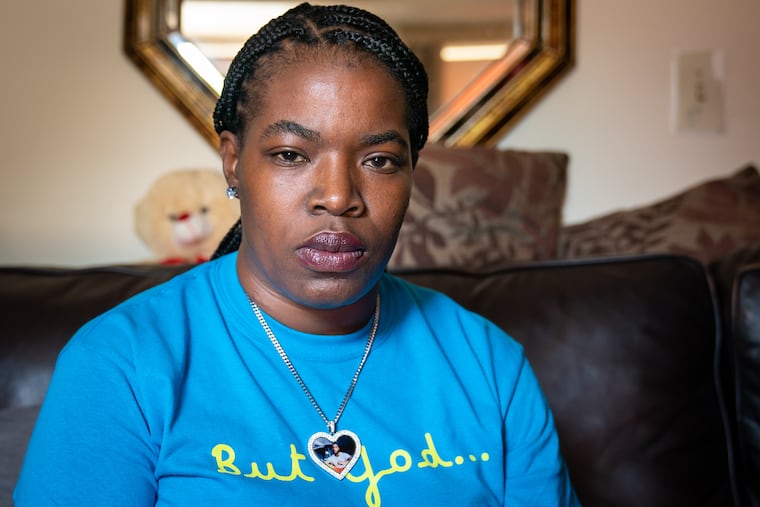Mothers of gunshot victims grieve in real time on social media | Helen Ubiñas
More mothers are sharing their pain lately, refusing to wait on anyone to unapologetically express their sorrow, to tell their stories of grief with posts that are often part therapy, part deterrent.

The video is only 2½ minutes long, but I couldn’t stop thinking about it.
Rebecca Thomas sits in the driver’s seat of her car, after pulling over on a North Philadelphia street, and speaks into the camera phone she’s propped up on her cup holder.
Less than 24 hours before, on July 13, her 27-year-old son, Zykeem Thomas, was shot and killed near a relative’s home on the 800 block of 10th Street. He was the same age his father had been when he was gunned down in 2002, and home for less than four months after serving a seven-year prison sentence on various gun charges.
Thomas doesn’t believe her son’s shooting was related to his past, but that didn’t mean she didn’t have a message for those who killed her son, one she pleaded with people watching to share.
“Nothing comes from being in the streets but graves and institutions,” she cried. “The streets don’t love y’all. They don’t care about y’all. Please stop. Please.”
It was a lesson the medical-billing specialist had often passed on to her four sons, ages 27 to 17, and one she believes her eldest son was finally heeding.
“I need every woman, as a mother, as a grandmother, as a sister, and as a cousin, and I need every man, as a father, and as a brother, as a cousin, and as a friend, to grab a young guy in your area, and just tell them to please put these guns down.”
I’ve heard these anguished cries many times. Too many. So has Pastor Carl Day, of Culture Changing Christians in North Philadelphia, who mentors Thomas’ youngest son.
And yet this time, we agreed when we talked, the pain hit differently.
There, in a couple of unfiltered minutes, was a mother — another mother — exposing her rawest moments of grief in a desperate attempt to spare others.
“It was brave,” Day said of the video he shared on his Facebook page. “I got emotional watching her pleading for all the nonsense to stop.”
It felt, he said, like a tipping point. And while I wasn’t sure, I hoped he was right.
I’d noticed a lot more mothers sharing their grief in real time lately, refusing to wait on anyone to unapologetically express their sorrow, to tell their own stories with painfully honest posts that are often part therapy, part deterrent.
Thomas had hoped that hearing a mother’s fresh pain would move someone to put down their gun.
In another video posted around the same time, another mother, Tamika Morales, hoped her pain would move someone to turn in the person who picked up a gun to kill her son. I watched her video with the same sense of awe.
It has been a devastating year for the family of 24-year-old Ahmad Morales, killed as he walked to a South Philadelphia corner store last year.
But on a recent July day, his mother thought that for that one day anyway, the pain might cede a little. Her two youngest were at a camp outing at a bowling alley in New Jersey. A photo shoot for a photographer’s project on mothers impacted by gun violence had been surprisingly restorative. She thought she might even take herself out to lunch.
And then her 14-year-old daughter called in tears to say that her 10-year-old brother was suddenly inconsolable. She wasn’t sure what triggered him. Grief doesn’t follow any schedule.
Warning: The following video includes explicit language.
“This is what I live with every day. The effects on the other kids is devastating and that’s the part y’all don’t see,” Morales tearfully says in her video. “I posted today because I want to be transparent because I’m tired of hiding it. They’re in this bowling alley right now, grieving, uncontrollably. They loved their brother. He was good to them. He was a good brother. He was good.”
For a few seconds it looks as if she’s struggling to breathe, and then makes one more plea: “Please stop the killing, please.”
Morales thought about deleting the video immediately after posting it. But then her daughter told her she should keep it up. People should hear what grief sounds like, what it looks like, long after the world has moved on.
We talk a lot these days about the lingering effects of trauma, how even one death reverberates through whole families and communities. But more and more we can see it, from those most impacted, choosing to share the reality of that trauma, in real time.
Sometimes, messy and explicit. Sometimes, angry and anguished, hopeless and hopeful. But almost always with courage and grace that deserve our full attention, and action.
In her short video, Thomas included a message for the person who killed her son.
“I forgive you and I pray that God forgives you, but it has to stop. Please stop, please.”